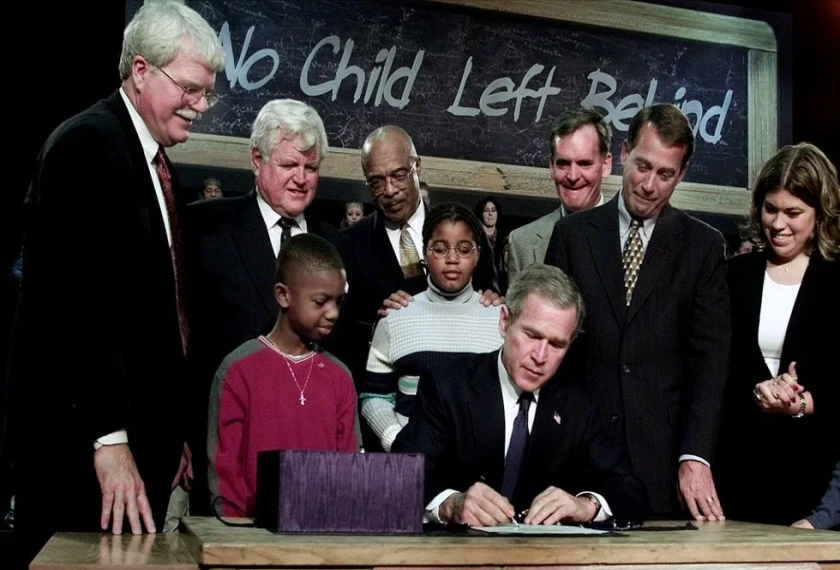From 2001 to 2015, the country was focused as never before on the improvement of public elementary and secondary education, using a federal law, the No Child Left Behind Act of 2001, as the guide. In 2015, NCLB was replaced by a statute, the Every Student Succeeds Act, that reverted to more traditional state control of education.
These reforms largely failed, but the problems calling for national action persist. As a longtime observer of the ways in which federal power can amp up state and local education improvement efforts, I’m persuaded that we need a new partnership now. This joint state-federal program must address the severest challenges facing American schools, challenges that are all too evident in recent results from the National Assessment of Educational Progress.
In 2022, student test scores declined in both reading and mathematics compared with 2019. Students experiencing the greatest difficulties were from Latino and African American families, some other minority-group families, and families with low incomes. In releasing the scores, U.S. Secretary of Education Miguel Cardona said the results constituted “an urgent call to action.”
“Let’s be very clear here,” he explained. “The data prior to the pandemic did not reflect an education system that was on the right track. The pandemic simply made it worse. It took poor performance and dropped it down even further.”
Action needs to come from both the federal government and the states. The truth is that while the states have responsibility for education under our political system, alone they can’t make the changes we need. That was implicitly recognized by Presidents Bill Clinton and George W. Bush, former state governors, who were leaders in the movement that resulted in NCLB. They balanced state and federal roles as they sought to improve education.
NCLB’s drafters, though, chose an unworkable way to gain this improvement. They placed on educators’ shoulders the full responsibility to raise student test scores and used penalties as the means to prod them. When Bush campaigned for NCLB, he put forward the notion that the proposed law would make socioeconomic status irrelevant for school success. It didn’t.
More than 50 years earlier, in 1966, researcher James Coleman concluded from his extensive work that a student’s socioeconomic status—as determined by parents’ income, jobs, and educational attainment—was by far the most important indicator of a student’s success in school. Students from families high on the socioeconomic scale gain the knowledge and skills to do well in school while those from families low on the scale often miss out. His findings have withstood all attacks against them through the NCLB era and beyond.
The problems calling for national action persist.
To counter the socioeconomic disadvantage, schools should make it possible for every student to succeed. The Chicago public schools, for instance, offer students summer programs, after-school programs, and individualized instruction by teachers assisted by specialized coaches. Substantial increases in student achievement have resulted—at a substantial cost.
As essential as it is to offer these programs, America’s roughly 13,300 school districts differ greatly on whether they will do so, reflecting their various levels of financial support and the proportions of their students needing extra services to succeed. State governments should assert their constitutional responsibility to ensure that districts provide meaningful educational opportunities for all their students.
The potency of socioeconomic status, however, is so great that its effects cannot be offset solely by school-based activities, no matter how good they are. A major reason is tax and economic policies that have contributed to rising inequality. The aim of these critical policies should be job creation and higher wages.
President Joe Biden and Congress expanded the Child Tax Credit Program to provide direct, monthly cash payments to more families. That helped to reduce the number of children living in poverty by 50 percent. That outcome, which stabilizes families, should lead over time to higher student achievement. Efforts to make the program permanent are currently stalled in the Senate.
The teacher crisis is another realm where high-level policy changes are needed. Uncertified, undercertified, and emergency/temporary licensed teachers are increasingly employed in American classrooms, especially those with enrollments of children from low-income families. “The current state of the teaching profession is at or near its lowest levels in 50 years,” concluded a 2022 analysis from the Annenberg Center at Brown University.
Lower pay for teachers than for other college graduates, little respect, fewer education school graduates, and accountability programs are among the reasons for this sad state of affairs. Remedies, such as attracting more higher-scoring college students to teaching, need collective consideration. The whole system from recruitment to retirement must be integrated and upgraded.
As the persons most responsible for public education in each state, governors should convene the appropriate parties to find solutions. Only the governor has the stature to undertake and solve such a complicated and political task. It was a governors summit convened by President George H.W. Bush that laid the groundwork for NCLB.
This new partnership must provide leadership and funding to schools instead of demanding more accountability. Extra help for students needing that assistance, building coalitions to advocate fairer tax and economic policies, and finding ways to create and retain a well-educated and trained teaching force should be the outcomes.
We have learned a great deal from earlier efforts to improve education. Now, we have to have the courage and persistence to make the changes that will ensure a good education for all students.






